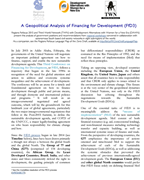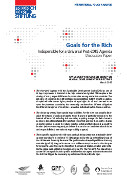Social Watch news
Published on Thu, 2015-03-19 18:39
On the 18th March, the Public Services International Research Unit (PSIRU) hosted a side event in New York to promote the report “Why Public-Private-Partnerships don’t work”. The report assessed the impact of Public-Private Partnerships (PPPs) actually undertaken in rich and poor countries. These global case studies show that there is no evidence that PPPs are cheaper or more convenient for governments in the long-term.
|
Published on Thu, 2015-03-19 18:27
Social Watch will organize -together with different partners- a number of meetings during the World Social Forum 2015 to be held from March 24 -28 in Tunisia.
These meetings will be an opportunity to review and reconsider new challenges of the Post 2015 framework and the Financing for Development process and the challenges the Arab countries are going through after the Arab Spring.
|
Published on Thu, 2015-03-19 18:27
An intergovernmental accountability mechanism for UN partnerships with the private sector is urgently needed. Regulation and safeguards must replace laxity and low taxes, so that the prevailing paradigm benefits developing countries rather than the corporations that invest in them. Regions Refocus 2015, Third World Network (TWN) and DAWN present their joint recommendations for Addis Ababa.
|
Published on Thu, 2015-03-19 16:39
 |
Spurred by the accelerated pace of globalization, and the rise and dominance of multinational and state-owned enterprises over the last few decades, scholars around the world researched many key industrial sectors and exposed the human rights consequences of our multi-faceted economic life. Today, we know the human rights consequences of resource extraction, as well as production, distribution, consumption and disposal of goods. We know how cross-border investments and trade facilitate those economic activities, and the human rights consequences to home and host countries and their citizens. We know the role that finance plays in investments and trade and how finance can both violate people’s human rights and help them realize their human rights. Several past financial crises, especially the most recent one, invited much scrutiny on the failure of the global financial system to pay attention to human rights consequences of its excesses. So it is none too soon that the United Nations’ Environmental Programme’s Inquiry into the Design of a Sustainable Financial System (the Inquiry) is asking about the role that human rights play in the design of a sustainable financial system.
|
Published on Wed, 2015-03-18 09:59
The Civil Society Reflection Group on Global Development Perspectives today launches its latest Discussion Paper. "Goals for the Rich - Indispensable for a Universal Post-2015 Agenda" deals with the question of how a fair sharing of costs, responsibilities and opportunities among and within countries can be achieved in formulating and implementing a Post-2015 Sustainability Agenda.
The Civil Society Reflection Group on Global Development Perspectivestoday launches its latest Discussion Paper. "Goals for the Rich - Indispensable for a Universal Post-2015 Agenda" deals with the question of how a fair sharing of costs, responsibilities and opportunities among and within countries can be achieved in formulating and implementing a Post-2015 Sustainability Agenda.
|
Published on Tue, 2015-03-17 14:02
Nigel Martin has spent 45 years trying to turn governments' ears toward civil society voices. In 1998, he founded FIM: the Forum for Democratic Global Governance, an international NGO based in Montreal. FIM both convenes activists from around the world with particular attention to those from the global south and from Muslim sectors, and it has worked to create openings for civil society actors in global governance fora such as the UN, G8, G20, and more recently BRICS (Brazil, Russia, India, China and South Africa) and the OIC (Organization of Islamic Cooperation).
|
Published on Fri, 2015-03-13 18:57
An interesting report named “Illicit financial flows, human rights and the post-2015 development agenda” has been submitted to the Human Rights Council on 9 March 2015 under the agenda item “Promotion and protection of all human rights, civil, in political, economic, social and cultural rights, including the right to development”.
The report outlines how illicit financial flows undermine the enjoyment of economic, social, cultural, civil and political rights and emphasizes the need for political action.
|
Published on Fri, 2015-03-13 18:35
The UN Statistical Commission discussed the challenges of the Post-2015 Development Agenda. This included implementation, measuring or monitoring progress as well as accountability. This includes a pragmatic look at the available data and implications for the Sustainable Development Goal indicators. Linkages between different agendas being negotiated in parallel such as Financing for Development, Post-2015 and Climate were starkly noticeable.
The 46th session of the Statistical Commission was held at the United Nations Headquarters, New York from 3 to 6 March 2015. The Commission attempted to tackle the issue of data in support of the post-2015 development agenda.
|
Published on Thu, 2015-03-12 18:22
The UN Statistical Commission concluded its meeting in New York last March 6 without agreeing on a list of indicators to measure the achievement of the Sustainable Development Goals (SDGs). The body is composed of 24 governments and it oversees the work of the UN statistical Division, the most important global agency on world indicators, in charge, among other things of defining how GDP is conceptualized and counted.
A preliminary list of indicators compiled from the suggestions of expert groups was deemed premature by the Commission, and instead a roadmap for the development and implementation of the indicator framework by the next Commission in 2016 was endorsed.
|
Published on Mon, 2015-03-09 16:11
The United Nations negotiations on the Post-2015 Development Agenda in New York saw Member States inching towards a political Declaration amidst considerable differences.
The Declaration is to lay the broader framework on which the more specific elements of the Agenda will rest in a separate outcome document. These will be adopted at the UN Summit on 25-27 September tilted "Delivering on and Implementing a Transformative Post-2015 Development Agenda".
|
SUSCRIBE TO OUR NEWSLETTER
Submit

|











